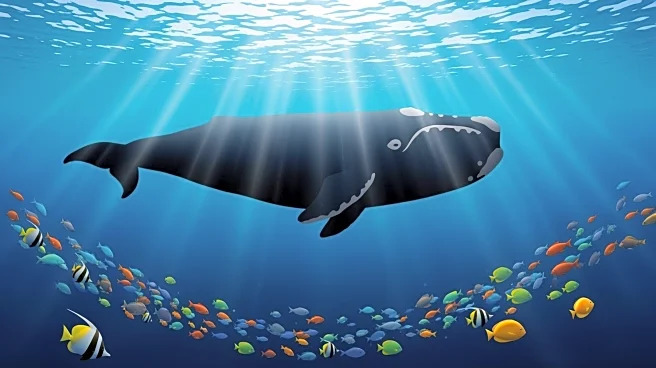What's Happening?
The North Atlantic right whale, one of the planet's rarest whale species, has shown a positive trend in population growth, according to a report by the North Atlantic Right Whale Consortium. The population has increased
to an estimated 384 whales, up from 376 the previous year. This marks a slow but steady growth over the past four years, reversing a previous decade of decline where the population fell by about 25% from 2010 to 2020. The increase is attributed to conservation measures, particularly new management strategies in Canada aimed at protecting the whales in the Gulf of St. Lawrence. These efforts have been crucial in mitigating threats such as ship collisions and fishing gear entanglements.
Why It's Important?
The growth in the North Atlantic right whale population is significant as it highlights the effectiveness of conservation efforts in reversing the decline of a species once on the brink of extinction. The whales are federally protected, and their recovery is crucial for maintaining marine biodiversity. The increase in population, coupled with no detected mortalities and fewer injuries, offers a cautiously optimistic outlook for the species' future. However, environmental groups warn that the whales remain at risk and require continued and enhanced protection measures to ensure their survival.
What's Next?
The future of the North Atlantic right whale depends on sustaining the current growth trend. Conservationists emphasize the need for stronger protective measures and legislative support to safeguard the species. The warming of ocean waters poses additional challenges, as it affects the whales' migration patterns and food availability. Continued monitoring and adaptive management strategies will be essential to address these challenges and support the whales' recovery.
Beyond the Headlines
The situation of the North Atlantic right whale underscores broader environmental and legislative challenges. The species' recovery is not only a testament to successful conservation strategies but also highlights the ongoing threats posed by climate change and human activities. The debate over the Marine Mammal Protection Act and NOAA's science-based safeguards reflects the tension between economic interests and environmental conservation. The outcome of this debate could have long-term implications for marine conservation policies and the survival of endangered species.











